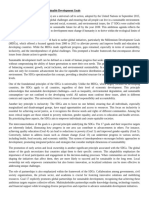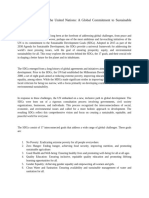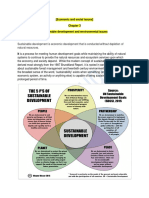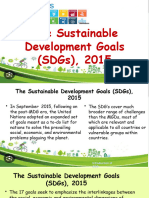Importance of Sustainable Development Goals
Importance of Sustainable Development Goals
Uploaded by
Alphin ManuelCopyright:
Available Formats
Importance of Sustainable Development Goals
Importance of Sustainable Development Goals
Uploaded by
Alphin ManuelCopyright
Available Formats
Share this document
Did you find this document useful?
Is this content inappropriate?
Copyright:
Available Formats
Importance of Sustainable Development Goals
Importance of Sustainable Development Goals
Uploaded by
Alphin ManuelCopyright:
Available Formats
IMPORTANCE OF SUSTAINABLE DEVELOPMENT GOALS (SDGS), SUSTAINABILITY REPORTING AND
SUSTAINABLE LIVING
Intro: Sustainable Development Goals (SDGs) play a vital role in all countries, where sustainability
reporting and sustainable living helps in achieving the SDGs
The United Nations put forth a new of set of 17 universal goals, known as “Sustainable Development
Goals (SDGs)” to address the environmental, social and economic challenges across the globe, which
was adopted by 193 countries of UN General Assembly in 2015. These SDGs were built on the
Millennium Development Goals (MDGs), which was started as a global effort to reduce extreme
poverty, child mortality, HIV/AIDS and other diseases, etc.
In addition to MDGs, the SDGs also include issues such as, natural resource management, sustainable
consumption and production, effective institutions, good governance, the rule of law and peaceful
societies. These 17 SDGs are interdependent and have 169 targets and 232 approved indicators to
measure the compliance. All the countries have a shared responsibility towards achieving the SDGs’
target by 2030 and have a significant role to play locally, nationally as well as globally.
Since the adoption of the SDGs, there have been many positive initiatives. Many countries have
started incorporating the goals into their national budgets, plans/strategies and have set up
coordinating structures for coherent implementation of goals across the sectors. Particularly, the
private sectors have begun to move away from their business-as-usual models to eco-friendly
businesses by adopting the goals in their policies/strategies and sustainability reporting.
SDGs will act as a compass, aligning the countries’ plans with their global commitments. To achieve
the SDGs target, the countries will require substantial resources, sustainable development
policies/plans, financing strategies, etc. The engagement of governments, civil society, the private
sector and other stakeholders will effectively contribute to the realisation of the SDG goals.
Sustainable living is nothing but living a socially responsible life by following some good habits such as
saving water, avoiding plastics, minimalizing resources, using eco-friendly products, reducing possible
emissions (less travel, low electricity usage), planting trees and encouraging social responsibility and
volunteering and creating awareness about SDGs.
You might also like
- CE403 - Lecture08 - Sustainable Development GoalsDocument19 pagesCE403 - Lecture08 - Sustainable Development GoalsnasifmorshedtoufiqueNo ratings yet
- Sustainable Dev Goals 2023 2024Document2 pagesSustainable Dev Goals 2023 2024khaoulakhokha270401No ratings yet
- CURRENT ISSUES IN NURSING WordDocument15 pagesCURRENT ISSUES IN NURSING Wordprosperduun0No ratings yet
- Paper IV - Sustainable Development GoalsDocument14 pagesPaper IV - Sustainable Development GoalsAnuj PoteNo ratings yet
- Community Health Nursing Learning Feedback Diary (LFD #6)Document2 pagesCommunity Health Nursing Learning Feedback Diary (LFD #6)Angelica Malacay RevilNo ratings yet
- Achieving Sustainable Development GoalsDocument10 pagesAchieving Sustainable Development Goalsvarshabijapur7No ratings yet
- Best Practices of The Minerals Industry in Addressing The 17 SDGs - Barcenal, F. M., Jr.Document33 pagesBest Practices of The Minerals Industry in Addressing The 17 SDGs - Barcenal, F. M., Jr.Fabie BarcenalNo ratings yet
- Environmental Science and Engineering - 2 - 1725256942349Document16 pagesEnvironmental Science and Engineering - 2 - 1725256942349shrawanichougule18No ratings yet
- FAQs Sustainable Development Summit FinalDocument6 pagesFAQs Sustainable Development Summit FinalAQILNo ratings yet
- SDG of IndiaDocument22 pagesSDG of Indiakinggoes2110003No ratings yet
- Civics For A Modern Bahamas - Chapters 9Document34 pagesCivics For A Modern Bahamas - Chapters 9Aafaaq AmirNo ratings yet
- Close Reading #1.: Sustainable Development Goals IntegrationDocument7 pagesClose Reading #1.: Sustainable Development Goals IntegrationKier Jhoem mahusayNo ratings yet
- Ybañez - NSTP QUIZ #8 FINALDocument1 pageYbañez - NSTP QUIZ #8 FINALMaria Elizabeth YbanezNo ratings yet
- Pop Quiz Reviewer (Sustainable Development) - IN DEPTH DESCRIPTIONDocument11 pagesPop Quiz Reviewer (Sustainable Development) - IN DEPTH DESCRIPTIONbarcenaljeremyNo ratings yet
- The SDG Mission of The United NationsDocument3 pagesThe SDG Mission of The United NationsAlfred ObligadoNo ratings yet
- Report Sustaina-Wps OfficeDocument4 pagesReport Sustaina-Wps Officequinterohazel466No ratings yet
- Exposure To Sustainable Development: - Raj DasDocument30 pagesExposure To Sustainable Development: - Raj Dasrajdas000211No ratings yet
- MDGS and SDGS AssignmentDocument3 pagesMDGS and SDGS AssignmentHuzaifa FaheemNo ratings yet
- Sustainable Development Goals - WikipediaDocument213 pagesSustainable Development Goals - WikipediarajalingamNo ratings yet
- Chapter 3 Sustainable Development PDFDocument13 pagesChapter 3 Sustainable Development PDFRahul Sharma86% (7)
- 2030 Agenda For Sustainable Development KCSD Primer enDocument2 pages2030 Agenda For Sustainable Development KCSD Primer enJhay Phee LlorenteNo ratings yet
- 2030 Agenda For Sustainable Development KCSD Primer NewDocument2 pages2030 Agenda For Sustainable Development KCSD Primer NewCROW THE PRONo ratings yet
- SLII Task 2Document9 pagesSLII Task 2Naimish AgarwalNo ratings yet
- The 17 GOALS Sustainable DevelopmentDocument1 pageThe 17 GOALS Sustainable Developmentfakeacc7019123No ratings yet
- Sustainable Development GoalsDocument14 pagesSustainable Development Goalskafi100% (1)
- Sustainable Development GoalsDocument1 pageSustainable Development Goalsapi-535659265No ratings yet
- Asg-2 EvsDocument5 pagesAsg-2 Evssomiyasharma379No ratings yet
- Chap3 5Document242 pagesChap3 5LATRELL CASTRONo ratings yet
- 17 SDG'sDocument1 page17 SDG'sorevillojhnNo ratings yet
- SDGs and MDGsDocument16 pagesSDGs and MDGsjayanti.raj21No ratings yet
- The Sustainable Development GoalsDocument3 pagesThe Sustainable Development GoalsffNo ratings yet
- 17 Sustainable DevelopmentDocument5 pages17 Sustainable DevelopmentArmel D BahodNo ratings yet
- EnviSci Sustainable DevelopmentDocument39 pagesEnviSci Sustainable Developmentkimberly RayoNo ratings yet
- SDGs .. Sustainable Development Knowledge PlatformDocument1 pageSDGs .. Sustainable Development Knowledge PlatformemmaehoskinsNo ratings yet
- 17 Sustainable DevelopmentDocument14 pages17 Sustainable Developmentilinri@gmail.comNo ratings yet
- SDGsDocument24 pagesSDGsakosibarbie001No ratings yet
- 1sustainable Development GoalDocument4 pages1sustainable Development Goal0coconub5No ratings yet
- Dev Econ-Case StudyDocument2 pagesDev Econ-Case StudylouvcasNo ratings yet
- Economics Presentation MEE AB 2Document12 pagesEconomics Presentation MEE AB 2abhishekbajpai209No ratings yet
- Final ScriptDocument3 pagesFinal ScriptheyNo ratings yet
- Env Law E-Notes 11Document9 pagesEnv Law E-Notes 11Mansi MalikNo ratings yet
- Denr Presentation Sustainable EnvironmentDocument39 pagesDenr Presentation Sustainable Environmentapi-3103215090% (1)
- Sustainable Development: Why in NewsDocument10 pagesSustainable Development: Why in NewsPranesh RamalingamNo ratings yet
- Sustaniable Development Goals 2023 - Guide # 4 EnglishDocument2 pagesSustaniable Development Goals 2023 - Guide # 4 EnglishBrygnith Caicedo CastilloNo ratings yet
- 17 Sustainable Development Goals (SDGS) 2030 Agenda For Sustainable Development Historic Un SummitDocument1 page17 Sustainable Development Goals (SDGS) 2030 Agenda For Sustainable Development Historic Un SummitJarotbemnkompinNo ratings yet
- Bel 47Document7 pagesBel 47Db DbNo ratings yet
- SDG Sandee FinalDocument11 pagesSDG Sandee Finalwienna1987No ratings yet
- SodapdfDocument1 pageSodapdfTatarUsanu 12No ratings yet
- Sustainable Development GoalsDocument64 pagesSustainable Development GoalsSsentongo NazilNo ratings yet
- Slidesgo Strategic Pathways To Achieve Sustainable Development Goals 202411100443100iJGDocument10 pagesSlidesgo Strategic Pathways To Achieve Sustainable Development Goals 202411100443100iJGuchiha69dhruvNo ratings yet
- UNCSD MGCY: Vision For Sustainable Development GoalsDocument1 pageUNCSD MGCY: Vision For Sustainable Development GoalsolimarmaisonetNo ratings yet
- Unit IDocument25 pagesUnit I1979nishasinghNo ratings yet
- SDGs WorksheetDocument13 pagesSDGs Worksheetjaninesuyon08No ratings yet
- Covepage of DavidDocument19 pagesCovepage of DavidANGELINA EMMANUELNo ratings yet
- Undp Study Guide 2023Document28 pagesUndp Study Guide 2023Doğa İnceNo ratings yet
- Understanding SustainabilityDocument25 pagesUnderstanding SustainabilityZoha ZehraNo ratings yet
- People Development & EnvironmentDocument233 pagesPeople Development & Environmentsawmya shanmuganathanNo ratings yet
- What Are The Sustainable Development GoalsDocument2 pagesWhat Are The Sustainable Development GoalsOliver SantosNo ratings yet
- The Significance of SDG and MDG GoalsDocument8 pagesThe Significance of SDG and MDG Goalssharmaji09gNo ratings yet



























































